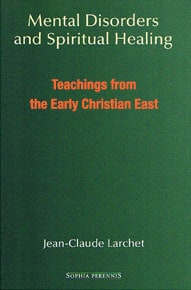Mental Disorders and Spiritual Healing: Teachings from the Early Christian East by Jean-Claude Larchet is an examination of mental illness from an Eastern Christian perspective.
Larchet completes a definitive work on the history, perceptions, and practices of the Eastern Church on mental illness. One has to read it for its historical value. This text is not for those looking at therapeutic solutions for those suffering or dealing with a person struggling with some form of mental illness.
The author’s knowledge of modern psychological conventions and Eastern Church practices is finely interwoven. He provided substantial documentation.
It is partly an apologetic of the Eastern Church writers in light of modern psychiatry. Larchet strives to promote that these Church leaders were very thoughtful and insightful concerning those with mental illness. He demonstrates that these leaders were not foolish or quick to attach a demonic definition to everyone with mental health issues.
He goes into considerable detail showing that many of the Eastern Church leaders discerned that it was a multifaceted problem–a physical disease or injury, a person’s temperament, demonic influences, and many other variables could be valid sources of a person’s mental suffering. Some solutions to this problem were long-time patient intervention, intense one-on-one relationships, specialized prayer, holy oil, singing or reciting scripture, seclusion, fasting, and encouraging sufferers to participate in their healing as much as possible. Larchet does not demonstrate any serious negative viewpoints on the treatment offered by these Eastern Church leaders.
There is a flaw. It outlines a general idea of dealing with mental illness within a Christian context but fails to build a clear doctrine. He introduced many Church leaders on the subject, but there is no perceivable pattern or evolution of thought around this issue.
This book hardly addresses the theological basis of mental illness and spirituality. It assumes that readers know what demons are and that they do exist. He rarely touches on these concepts. Neither does it address why there was so much emphasis on expelling demons in Jesus’ ministry while other pieces of Jewish literature were less inclined to do the same during this period. Nor did he express the influences that led to the informal structure Eastern Christians used in response to this disorder.
Jennifer Doane Upton would disagree with the assessment of this book so far; she takes an altogether different perspective in her book review found at the publisher’s website, Sophia Perennis:
Mental Disorders and Spiritual Healing presents the viewpoint on mental disorders held by the early Church Fathers, and in so doing provides a fresh “new” look at psychotherapy, as seen from the standpoint of a tradition which knows the human being as composed of body, soul and Spirit, and gives precedence to the Spirit. The author, Jean-Claude Larchet, is a practicing psychiatrist as well as an Eastern Orthodox Christian.
One wonders if he is choosing the best writers on the subject and ignoring the poorer ones, such as the writings of Pachomius, who believed that anyone with a demon had a sign of a physical entry point. It was Pachomius duty to find the entry point and expel the demon, whether in the finger, foot or whatever. Although the many writers he lists are prominent, one questions whether their opinion was the popular one or did the masses follow something similar to Pachomius.
This is not a how-to guide distinguishing between mental illness and demonism. If anything, Larchet promotes that the eastern fathers treated whatever state the person was in with respect. However, some of their practices seem barbaric to our standards — like placing a violent-to-self or -other type person in a secured sack until the anger diminishes.
Mental Disorders and Spiritual Healing has two outstanding traits. The first one is the Eastern Church’s perception of a psychological condition they called acedia — a type of sadness equivalent to our modern definition of depression. The book itself does not make this correlation, but it seems close. It lists various remedies that do not deal with sadness directly but limit the various expressions of sadness to cure it. It also demonstrates that ancient authors have identified a human condition whose appearance has not changed even to this day.
The second is found in the last chapter, entitled A Most Singular Kind of Folly: The Fool For Christ. It has little to do with defining mental disorders, but is about a stratum of Christians who purposely pretended to be mentally ill for various reasons; whether to attain humility through abuse or rejection, or it was a representation of detachment from this world, or it was for charity purposes. If one feigned madness, this gave entrance to the world of the low and downtrodden. This association became a source of ministry.
It is a relatively easy book to read. The author uses technical vocabulary but never quotes esoteric texts in the original Greek or Latin to prove his point. The English reader can understand everything.
The whole subject of the relationship between mental illness and spiritual influences is severely under-represented in Christian literature. The author is one of the few, and maybe the only one, that has attempted such a rigorous examination. It is a good start. Hopefully, more researchers will use this to build a more complete framework.
Mental Disorders and Spiritual Healing: Teachings from the Early Christian East by Jean-Claude Larchet, Translated by Rama P. Coomaraswamy and G. John Champoux, can be found at Amazon. It is only available in print format.
See also the previous article on this subject A Religious Look at Miracles and Mental Illness.
